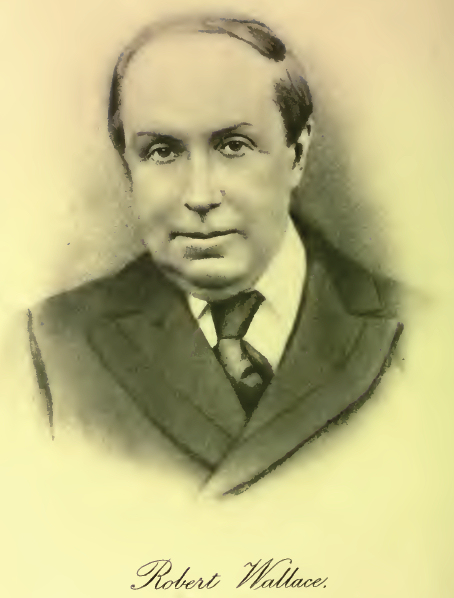|

Robert Wallace was a
Scottish writer who had a remarkably varied career as a
classics teacher, minister, university professor,
newspaper editor, barrister and finally a member of
parliament. He was born on 24 June 1831 at Kincaple near
St. Andrews, Fife, and was the second son of Jasper
Wallace, a gardener, and Elizabeth Archibald. He was
educated at the Geddes Institution, Culross, Fife, and
at the University of St. Andrews where he graduated M.A.
in 1853. He was awarded the degree of D.D. by Glasgow
University in 1869. He married Margaret Robertson (died
1898) on 10 March 1858 and they had six sons and one
daughter. While he was minister at Old Greyfriars Church
in Edinburgh, he was involved in attempts to reform and
modernise the Church of Scotland. As a result, his
fitness to be a minister was questioned and presumably
this controversy influenced his decision to leave the
clerical profession. He died in London on 6 June 1899.
Robert Wallace, Life and
Last Leaves
Edited by J. Campbell Smith and William Wallace (1903) (pdf)
Preface
Some years before his death
my late brother arranged with the publishers of this
volume to write a full account of his varied career
under the title of “Recollections of a Chequered Life.”
The fragment which, as “Reminiscences,” forms the first
portion of the present work, will show how short a
distance he had travelled towards the accomplishment of
his design, and how great a loss the literature of
autobiography has sustained by his death.
No attempt has been made here to continue the
contemplated work. Such an attempt could only have met
with disastrous failure. It is clear that my brother
meant two things by his original design—to show the
moral continuity and inevitableness of his “chequered”
experiences, and (not being an egotist in the aggressive
or self-conscious sense) to illustrate the general life
of Scotland and his time, so far as that came within his
knowledge, by means of these experiences. It is obvious
that only he could have done this. But Sheriff Campbell
Smith, who kindly undertook to write a sketch of his
early years, elucidating and supplementing the “
Reminiscences,” has, as the oldest and most intimate
friend among his surviving contemporaries, been able so
far to follow the plan of the original work as to
illustrate the university and religious life of Scotland
by means of his career.
My part in this book, of the slightness of which I am
painfully conscious, has been to let my brother speak
for himself as a public writer and a politician, because
it was in these two capacities that he spoke with a
freedom and a power which—in his own opinion, at all
events—he did not command as a minister of the Church of
Scotland. As explained in the chapter on journalism, I
have been prevented by considerations of space from
giving the whole or even the best of his contributions
to newspaper literature; and the same remark applies,
though in a lesser degree, to the chapters on politics.
Nevertheless the development of his life, as it was
largely given up to thought and observation, may, it
seems to me, be not inadequately traced in these
portions of the book.
My brother did hot write many letters, at least of a
biographical interest, to friends and contemporaries,
and seems to have preserved very few of the letters he
received. He was averse to unbosoming himself; besides,
the struggle, if not for existence, certainly for the
free development of life, left him no time for the
cultivation of the epistolary art either as an amusement
or as a relief.
The second part of this volume consists mainly of the
more important of the lectures, which, in the latest
years of his life, my brother delivered in various parts
of the country. Though, in my opinion, they are as
readable and as much works of art as anything he ever
wrote, they cannot be regarded as essential to his life
like his speeches or his leading articles. I have also
included in this section two speeches he delivered on
Burns, and some reminiscences by his and my friend, the
Rev. Roderick Lawson. I have been pressed to publish his
lectures as professor and some of his sermons,
especially those he wrote as minister of Greyfriars
Church. But I know from conversations with him that he
did not desire any of these to be published, and that he
certainly would not have published them had he lived.
His wish, wherever I have been certain of it, has been
law to me in connection with this book.
I have to thank the proprietors and editor of the
Scotsman for granting me permission to quote from the
articles contributed by my brother to that newspaper,
and for enabling me to identify them without difficulty.
My thanks are also due to the editors of various
magazines for similar courtesies.
I have finally to express my gratitude to Mr. J. D.
Cockburn, of Glasgow, for varied and valuable
assistance.
WILLIAM WALLACE.
Glasgow, June, 1903.
Download
Robert Wallace, Life and
Last Leaves here |

